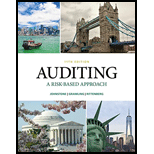
Concept explainers
a.
Concept Introduction: Professional judgment means the application of professional knowledge and competence to the available pieces of evidence and circumstances and arriving at a conclusion.
The indicators of poor professional judgment
b.
Concept Introduction: Professional judgment means the application of professional knowledge and competence to the available pieces of evidence and circumstances and arriving at a conclusion.
The auditor’s motivation
c.
Concept Introduction: Professional judgment means the application of professional knowledge and competence to the available pieces of evidence and circumstances and arriving at a conclusion.
The consequences of auditor’s action in the given case.
Want to see the full answer?
Check out a sample textbook solution
Chapter 1 Solutions
Auditing: A Risk Based-Approach (MindTap Course List)
- what is harrison inc.'s payout ratio for 2023?arrow_forwardCalculate equity multiplier, debt ratio and return on equityarrow_forwardAt Baxter Company, as of June 30, the company has net sales of $400,000 and a cost of goods available for sale of $350,000. Compute the estimated cost of the ending inventory, assuming the gross profit rate is 40%.arrow_forward
- Hi expert please give me answer general accountingarrow_forwardIn 2022, Sheridan Ltd. issued $53,000 of 8% bonds at par, with each $1,000 bond being convertible into 100 common shares. The company had revenues of $76,200 and expenses of $36,300 for 2023, not including interest and tax. (Assume a tax rate of 25%) Throughout 2023, 1,000 common shares were outstanding, and none of the bonds were converted or redeemed. (For simplicity, assume that the convertible bonds' equity element is not recorded.)Assume that 11 of the 53 bonds were converted on July 1, 2023. Calculate diluted earnings per share for the year ended December 31, 2023. (Round answer to 2 decimal places, e.g. 15.25.)arrow_forwardAccountingarrow_forward
- Anant Enterprises has sales of $750, total assets of $450, and a debt/equity ratio of 1.80. If its return on equity is 12 percent, what is its net income? Solve this problemarrow_forwardwhat is harrison inc.'s payout ratio for 2023? subject-accountarrow_forwardhello tutor help this answer accountingarrow_forward
 Auditing: A Risk Based-Approach (MindTap Course L...AccountingISBN:9781337619455Author:Karla M Johnstone, Audrey A. Gramling, Larry E. RittenbergPublisher:Cengage LearningPrinciples of Accounting Volume 1AccountingISBN:9781947172685Author:OpenStaxPublisher:OpenStax College
Auditing: A Risk Based-Approach (MindTap Course L...AccountingISBN:9781337619455Author:Karla M Johnstone, Audrey A. Gramling, Larry E. RittenbergPublisher:Cengage LearningPrinciples of Accounting Volume 1AccountingISBN:9781947172685Author:OpenStaxPublisher:OpenStax College Auditing: A Risk Based-Approach to Conducting a Q...AccountingISBN:9781305080577Author:Karla M Johnstone, Audrey A. Gramling, Larry E. RittenbergPublisher:South-Western College Pub
Auditing: A Risk Based-Approach to Conducting a Q...AccountingISBN:9781305080577Author:Karla M Johnstone, Audrey A. Gramling, Larry E. RittenbergPublisher:South-Western College Pub- Business/Professional Ethics Directors/Executives...AccountingISBN:9781337485913Author:BROOKSPublisher:Cengage




